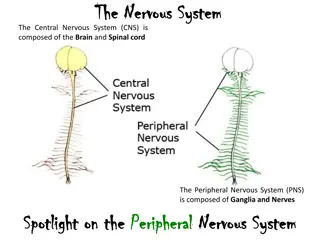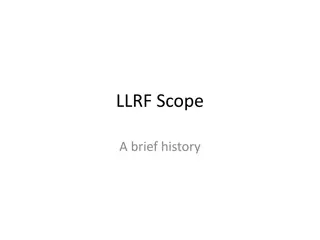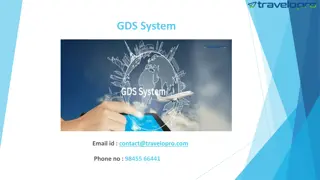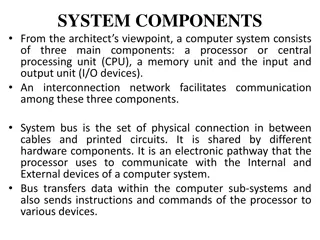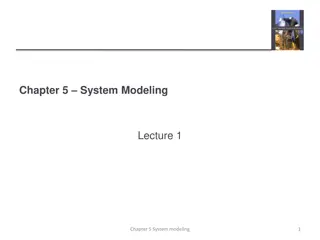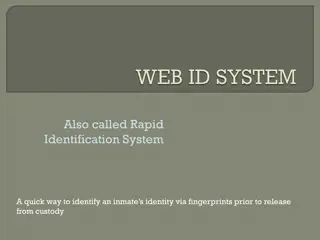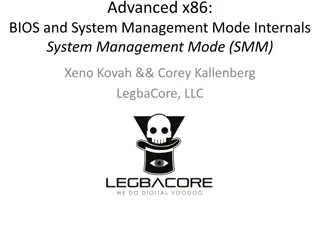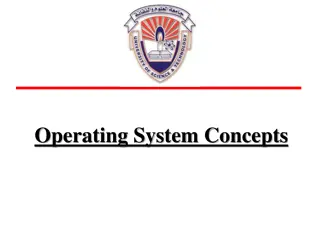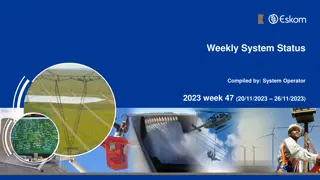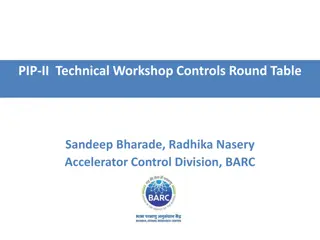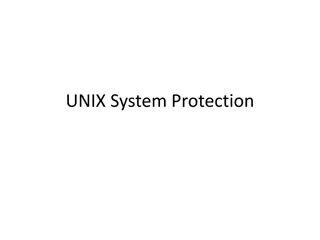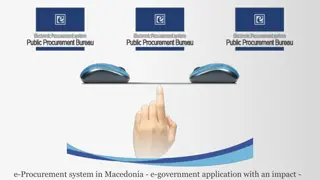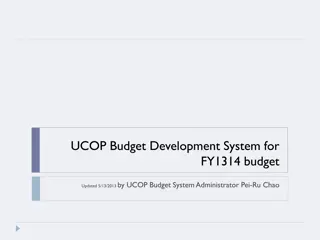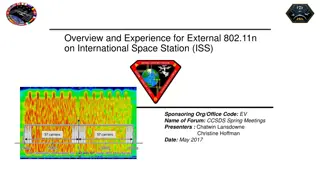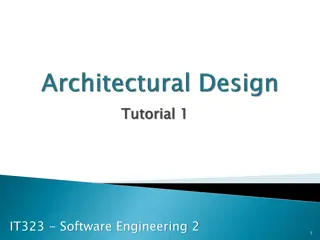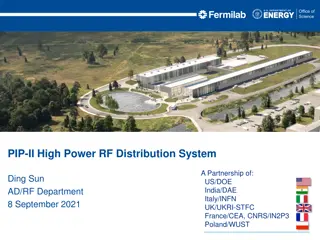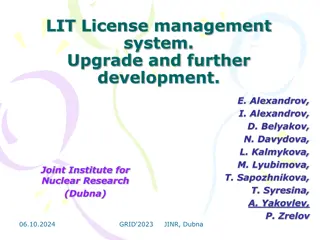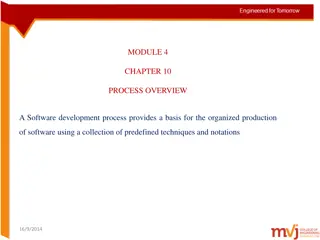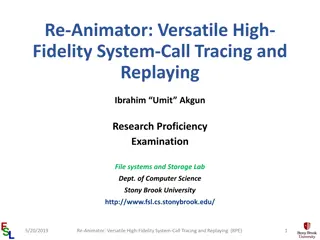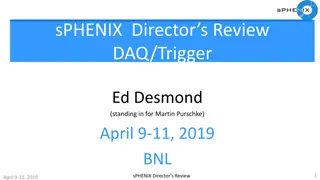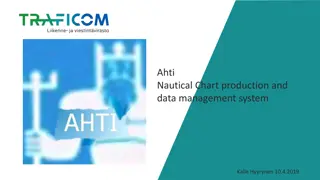SACE Teachers Conference: Enhancing Professional Development in Education
The SACE Teachers Conference focuses on improving teacher education through developing a National Framework for Teacher Education in SA. The Ministerial Committee on Teacher Education aims to create a coordinated system for both initial and continuing professional education. Recommendations include
3 views • 34 slides
Overview of ESRF-EBS 352 MHz RF System Upgrade at 26th ESL RF Meeting
The 26th ESL RF Meeting held at Elettra in Trieste discussed the status and upgrades of the ESRF-EBS 352 MHz RF system. The meeting covered topics such as the EBS RF layout, HOM damped cavities, RF ECO-Mode, ongoing RF projects, and the replacement of klystrons with SSAs for a 4th harmonic RF system
0 views • 16 slides
adonai software
Adonai college Management System is a cloud-based ERP System that delivers various College and School Management Systems, College and School Management Software, College and School Management System ERP, College and School Management Software System, Online College and School Management Software Sys
3 views • 1 slides
System Models in Software Engineering: A Comprehensive Overview
System models play a crucial role in software engineering, aiding in understanding system functionality and communicating with customers. They include context models, behavioural models, data models, object models, and more, each offering unique perspectives on the system. Different types of system
5 views • 33 slides
The Nervous System: CNS, PNS, SNS, and ANS
The nervous system comprises the Central Nervous System (CNS) and Peripheral Nervous System (PNS), with the PNS further divided into the Somatic Nervous System (SNS) and Autonomic Nervous System (ANS). The SNS controls voluntary movements of skeletal muscles, while the ANS regulates involuntary proc
2 views • 23 slides
Overview of LLRF Scope and Development
The LLRF system is responsible for controlling the phase and amplitude of cavities in the linac system. The cost book details the budget for implementing the LLRF system in 155 systems. Adaptations were made to the PEG for delivering and installing the LLRF systems. A schedule outlines the developme
1 views • 8 slides
Enhancing Local Development Through Integrated Planning: A Critical Analysis
The background paper explores the relevance of integrated development plans for achieving sustainable local development in Zambia. It highlights weaknesses in national development plans, development coordinating committees at provincial and district levels, and district-level spatial plans. The intr
0 views • 13 slides
GDS System
Travelopro Global Distribution System (GDS) is a computerized network system. It is a large computer network which is integrated with 100 of worldwide Airlines and consolidators for enabling transactions between travel agents and travel sites and also used by airlines, hotels, car rentals, railways
4 views • 15 slides
The Immune System: Organs, Functions, and Importance
The immune system acts as a defense mechanism against pathogens and infections, comprising various organs, such as the bone marrow, thymus, spleen, white blood cells, antibodies, complement system, and the lymphatic system. It works to recognize and destroy harmful microbes, maintaining the body's h
1 views • 23 slides
Evolution of Land Law Systems in Trinidad and Tobago
Trinidad and Tobago's land law systems consist of the Common Law System and the Registered Land System. The Common Law system governs unregistered land where title passes upon execution and delivery of the deed. In contrast, the Registered Land System confers ownership upon registration and offers c
0 views • 28 slides
Computer System Buses: Components and Functions
A computer system comprises three main components - the CPU, memory unit, and I/O devices connected via an interconnection network, facilitated by the system bus. System buses reduce communication pathways, enabling high-speed data transfer and synchronization between components. Internal buses conn
4 views • 55 slides
System Modeling in Engineering
System modeling in engineering involves developing abstract models to represent a system from various perspectives using graphical notations like UML. These models aid in understanding system functionality, communicating with stakeholders, and documenting requirements for new systems. Existing and p
5 views • 53 slides
Rapid Identification System for Inmate Release
The Rapid Identification System, also called Rapid ID System, provides a quick way to verify an inmate's identity using fingerprints before release from custody. It allows law enforcement agencies, including IPD users under SDSheriff, to log in and access the system. By searching the San Diego AFIS
5 views • 8 slides
System Management Mode (SMM) in x86 Processors
System Management Mode (SMM) is a highly privileged mode in x86 processors that provides an isolated environment for critical system operations like power management and hardware control. When the processor enters SMM, it suspends all other tasks and runs proprietary OEM code. Protecting SMM is cruc
1 views • 26 slides
Revolutionizing Paper Mill Operations with AutoRate System by P.L.C
AutoRate system by P.L.C offers a superior alternative to manual feed rate control in paper mills, addressing issues of operator variability and inconsistent system responses. By utilizing a Virtual Controller based on inherent system values, the system enhances overall consistency and efficiency, r
3 views • 12 slides
Use Case Modeling in System Development
Use case modeling is a critical aspect of system development, capturing system behavior and interactions. It involves representing how a business system interacts with its environment through formal scenarios. Use cases benefit communication, identification, and verification, providing a clear under
0 views • 34 slides
Theories of Human Development in Psychomotor Domain
The psychomotor domain involves the development of muscle skills associated with mental processes. Psychomotor development progresses through cognitive, associative, and autonomic stages, where individuals learn to perform new skills that involve both the body and mind. In the cognitive stage, one n
0 views • 12 slides
LJMU's New Curriculum Management System Project Overview
LJMU's new curriculum management system project aims to streamline course information production and storage by implementing the Courseloop system. The project timeline includes releases for data governance, migration, testing, and training leading up to the system's go-live in September 2022. The p
1 views • 8 slides
Operating System Concepts: Lecture Overview and Services
Exploring the lecture content on operating system concepts, structures, services, system calls, and file manipulation. Delve into the importance of operating system services, error detection, program execution, I/O operations, protection, security, and resource allocation in operating systems. Learn
5 views • 26 slides
Functional Regional Concept for Sustainable Urban Mobility Planning
The Functional Regional Concept emphasizes sustainable urban mobility planning as an integral part of integrated urban development. This concept aims to support economic and social growth by adjusting the transport system to various activities within a city. It focuses on sector/system sustainabilit
0 views • 20 slides
System Sequence Diagrams: Understanding Artifact for System Behavior
System Sequence Diagrams (SSDs) are vital artifacts that visually illustrate input and output events related to a system. They help define system behavior and interactions, making them essential during the logical design phase of software applications. By depicting events in sequential order, SSDs o
3 views • 24 slides
Weekly System Status Update: Adequacy of National Electricity Supply (Week 47, 2023)
This weekly system status report compiled by the System Operator provides insights into the National Electricity Supply System's adequacy in the medium term. It includes data on historic daily peak system capacity/demand, available dispatchable generation, operating reserve margin, forecast vs. actu
1 views • 14 slides
Development and Permitted Development in Town Planning
Development in town planning encompasses a wide range of activities, from building and engineering to changes in land use. Permitted Development under the General Permitted Development Order grants deemed planning permission for specific types of development. Schedule 2, Part 1 outlines Classes A-H
0 views • 16 slides
SVOM Burst Advocate System Development Overview
SVOM, set for launch in 2021-2022, aims to employ Burst Advocate tools, learning from the GWAC system. Challenges and advancements in the BA system development, data collection, login system, real-time validation, and follow-up observations are discussed in detail. The system's key philosophy revolv
0 views • 14 slides
Advanced Controls and Systems Development in Accelerator Technology
Explore the cutting-edge technologies and extensive experience in system development within the Accelerator Control Division at BARC. The workshop covers a range of topics including SoC-FPGA system architecture, GUI development for RF control, EPICS application development, and lessons learned in im
2 views • 15 slides
Overview of UNIX System Protection
UNIX System Protection focuses on ensuring security and access control mechanisms within the UNIX operating system. Developed in 1969 by Dennis Ritchie and Ken Thompson at AT&T Bell Labs, UNIX features design elements like a portable API, protection rings, kernel processes, and a trusted computing b
0 views • 12 slides
Evolution of E-Procurement System in Macedonia
The e-Procurement system in Macedonia has evolved significantly since its initial development in 2008, with the launch of a web-information system for publishing contracts. The process of integration of various functionalities, setup, and development of the new integrated system have been crucial st
0 views • 26 slides
UCOP Budget Development System Overview
Detailed overview of the UCOP Budget Development System for the FY1314 budget, including system logon instructions, workflow navigation, tool bar overview, data entry flow, payroll budget entry, budget allocation, review process, and deadlines for submission. The system provides access to view/edit/
0 views • 15 slides
Bulgarian National Control System in the Danube Region Programme
The Bulgarian national control system for the Danube Region Programme involves a centralized approach from 2021-2027. The Ministry of Regional Development and Public Works oversees the system, with controllers appointed at the national level. The system includes a National Control Unit with quality
0 views • 10 slides
Overview of External Wireless Communication System on International Space Station (ISS)
This presentation covers the overview and experience of implementing an external 802.11n wireless communication system on the International Space Station (ISS). It discusses the existing wireless system, committed users, system architecture, and future challenges. The system provides high data rate
1 views • 18 slides
Designing System Architecture Before Requirements: Importance and Best Practices
When describing a system, designing the architecture before completing the requirements specification can aid in structuring the specification, enabling the development of subsystem specifications concurrently, facilitating hardware manufacture by subcontractors, and providing a model for system cos
0 views • 21 slides
PIP-II High Power RF Distribution System Overview
The PIP-II High Power RF Distribution System is a collaborative project involving various countries and institutions to develop a sophisticated system capable of efficiently distributing RF power to superconducting cavities. The system consists of multiple distribution lines and components designed
0 views • 28 slides
License Management System Upgrade and Development Overview
This project focuses on upgrading and enhancing the license management system at the Joint Institute for Nuclear Research in Dubna. It addresses challenges related to optimizing license usage through different types of licenses and monitoring systems. The system architecture includes components like
0 views • 18 slides
Software Development Process Overview
A software development process provides a structured approach for creating software using predefined techniques and stages such as system conception, analysis, system design, class design, implementation, testing, training, deployment, and maintenance. It involves stages like domain analysis, applic
0 views • 39 slides
Long-Baseline Neutrino Facility (LBNF) Primary Beamline LCW System Overview
The Long-Baseline Neutrino Facility (LBNF) Primary Beamline Low Conductivity Water (LCW) System comprises various technical design aspects including system operational scope, major system updates, design requirements, and component summary. It involves the provision of LCW cooling for magnets and po
0 views • 14 slides
Re-Animator: Versatile System Call Tracing and Replaying
Re-Animator is a research project focusing on creating a high-fidelity system call capturing system with minimized overheads. The project aims to capture long-running applications and provide scalable and verifiable system call replaying. It introduces two prototype system call tracing systems and h
0 views • 39 slides
Strategies for Enhancing Extended Producer Responsibility System in Bulgaria
Korea-Bulgaria Knowledge Sharing Program focused on sharing strategies to enhance Bulgaria's Extended Producer Responsibility (EPR) system. The program discusses the current status, performance evaluation, issues, and recommendations related to the EPR system in Korea. It covers topics like beverage
1 views • 38 slides
Achieving Human Rights and Development in Developing States: A Comparative Analysis
Human rights and development in developing states are crucial components, with a focus on economic and social development models. The discussion covers the concept of human development, state development, Sustainable Development Goals, comparisons between Tamil Nadu, Gujarat, and Kerala, and expert
1 views • 10 slides
sPHENIX DAQ/Trigger System Overview
The sPHENIX DAQ/Trigger system is the focus of this review, covering the hardware, procurements, technical status, and deliverables of the system. Key components include Data Collection Modules (DCM-II), SubEvent Buffers (SEB), control machines, and global level 1 system. The system aims to achieve
0 views • 21 slides
Ahti Nautical Chart Production and Data Management System Overview
Ahti Nautical Chart Production and Data Management System, led by Kalle Hyyrynen, aims to modernize nautical chart production by utilizing standardized products, improving system technology, and enhancing data management. The project addresses challenges such as outdated technology, integration need
0 views • 7 slides




